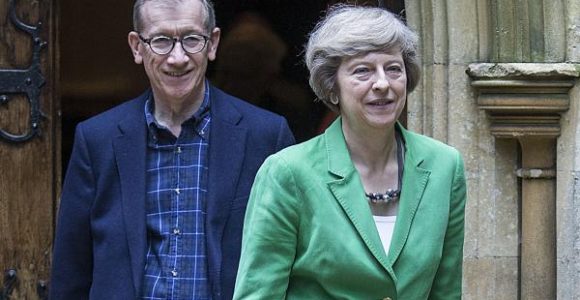May vows to crack down on greed of big business

Theresa May has promised to curb executive pay and install employees on company boards as she signals a break from David Cameron and George Osborne on the economy.
The home secretary will launch her national campaign to become prime minister in Birmingham today with an admission that too few people are sharing in economic success. She will pledge to clamp down on the irresponsible behaviour of big business.
In an article in The Times today, Mrs May suggests that dealing with debt and the deficit is not enough. “We need an economy that works for everyone. Because it is apparent to anybody who is in touch with the real world that people do not feel our economy works that way at all,” she says, adding: “We need to reform the economy to allow more people to share in the country’s prosperity.”
The Conservatives fought the last election rejecting the idea that the fruits of economic growth were unequally shared.
Mrs May’s speech is an attempt to move the agenda from a weekend dominated by Andrea Leadsom’s remarks that being a mother makes her a better choice for leader because it means that she has “a very real stake” in the future of the country.
Mrs May was unable to have children and the comments, made in an interview , prompted a backlash from Tory MPs. Sir Eric Pickles, the former cabinet minister, said yesterday that Mrs Leadsom had handled the episode poorly. “I don’t like to see those kind of reactions in a potential prime minister,” he told Sky News. Others called on Mrs Leadsom to withdraw her candidacy, with most blaming naivety rather than a deliberate attempt to target Mrs May.
Lord Cormack, the former Tory MP, said: “The greatest contribution she could make to her country and her party right now would be to withdraw.”
Mrs May’s pledge on the economy, her first major intervention on the subject, marks a significant change of tone.
She says: “Talk to almost any ordinary member of the public and the frustration they feel about the loss of control over their day-to-day lives is obvious. They are the ones who made real sacrifices after the financial crash in 2007. Some lost their jobs, some reduced their hours, others took a pay cut. Wages have grown, but only slowly. Taxes for the lowest paid went down, but other taxes, like VAT, went up.”
She goes on to highlight her awareness of the pressure caused by rocketing energy bills, echoing the central theme of the general election campaign fought by Ed Miliband, the former Labour leader.
Her pledge to overhaul corporate rules means that both candidates for the Tory leadership are preparing to confront big business — a tacit admission that the party may have been too close to corporate interests under the current leadership.
This could cause discomfort among some Tory MPs who are committed to free enterprise, and donors who want greater focus on infrastructure projects and tax cuts.
The move also marks a raid on her opponent’s territory, after Mrs Leadsom attacked “boardroom pay rises that bear no relation to company performance” in her pitch for the leadership last week.
Mrs May wants boards to include workers because at the moment they consist of the “same, narrow social and professional circles as the executive team and the scrutiny they provide is often limited”. Trade unions and workers’ activists have campaigned for the move as a way of stopping exorbitant pay rises.
In another significant development, Mrs May says that she wants to tackle the “irrational, unhealthy and growing” gap between what companies pay workers and bosses by making shareholder votes on corporate pay binding, rather than advisory.
Most recently this would have stopped Bob Dudley, chief executive of BP, from receiving a pay package of almost £14 million after 59 per cent of investors voted against it. The payout went ahead because the vote was only advisory. She also wants full disclosure of bonus targets and the publication of “pay multiple” data: the ratio between the chief executive’s pay and the average worker’s pay.
Mrs May argues: “It is not anti-business to suggest that big business needs to change. Better governance will help these companies to take better decisions, for their own long-term benefit and that of the economy overall. Under my leadership the Conservative Party will resolutely remain the party of enterprise and we will help British businesses to stay competitive and create more well-paid jobs.”
Mrs May is also the first senior politician to publicly say that Bank of England policy has increased inequality. The home secretary, who started her career at the bank, admits that actions taken by successive governors have led to soaring property prices. “Monetary policy — in the form of super-low interest rates and quantitative easing — has helped those on the property ladder at the expense of those who can’t afford to own their own home.”



